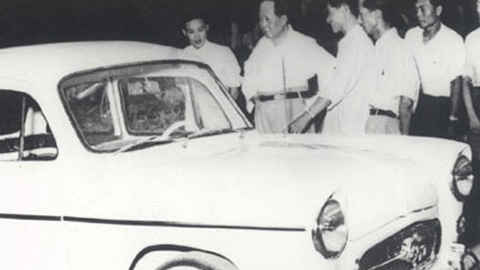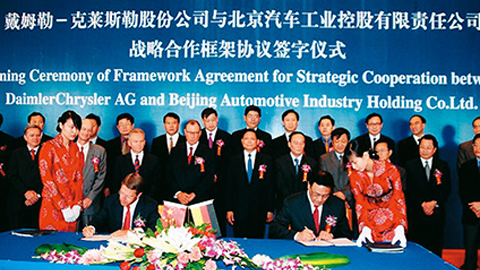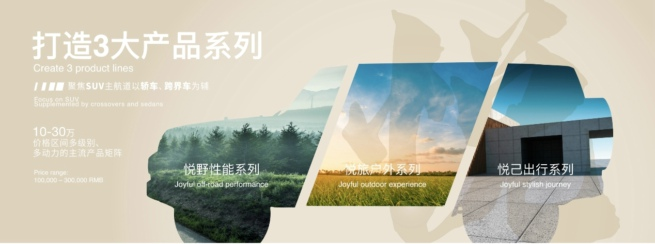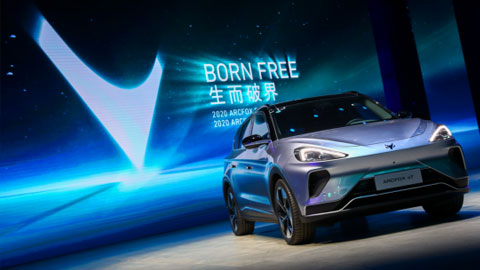Hi, this is Gasgoo. In this episode of "Wheels of Change: Stories of Chinese Auto Giants," let's talk about BAIC Group, which has been quite low-profile in recent years.
Currently, there are five major business segments under BAIC Group, which are BAIC BJEV, BAIC Motor, BAIC Foton, Beijing Benz Automotive Co. (BBAC), and Beijing Hyundai Motor.
From independent entrepreneurship to joint venture, BAIC Group continues to forge ahead
On June 20th of 1958, China's first independently-developed sedan "Jinggangshan" was born, marking the official beginning of Beijing vehicle production.

Photo credit: BAIC Group
On June 27th of the same year, the inaugural meeting of Beijing Automobile Factory was held. Since then, Beijing had its first state-approved vehicle manufacturing plant, signifying the official commencement of the Beijing automotive industry.
On July 30th of 1973, Beijing Automotive Industry Corporation, the predecessor of BAIC Group, was formally established. From the production of the "Jinggangshan" sedan to the establishment of Beijing Automotive Industry Corporation, BAIC has gradually become one of the important players in the Chinese automotive industry.
In 1983, Beijing Automotive Engineering Company (BAECO) and American Motors Corporation (AMC) signed the general contract for the joint venture of Beijing Jeep Corporation, which is the first Sino-foreign joint venture in the manufacturing of complete vehicles for the Chinese automotive industry, setting a precedent for such collaborations.
Photo credit:BAIC Group
In 1984, Beijing Jeep Corporation was officially established, producing Jeep Cherokee models under Chrysler's introduction.
Beijing Jeep Corporation was initiated by the local government and approved by relevant departments before China decided to establish the automotive industry. It was an early experiment in establishing Sino-foreign joint ventures during the initial stages of China's reform and opening up.
In 1985, AMC was acquired by Chrysler, and in 1998, Chrysler merged with Daimler. Beijing Jeep thus experienced numerous changes in ownership and various ups and downs throughout this period.
The joint venture with Hyundai Motor has brought BAIC to a new stage of development.
On May 28th of 2002, BAIC Group and South Korea's Hyundai Motor Company signed a contract in Seoul to establish Beijing Hyundai Motor Co. Ltd., with a 50:50 joint venture ratio. The initial investment was $250 million, aimed at producing Hyundai Sonatas and Elantras.
On October 18th, Beijing Hyundai Motor Co., Ltd. was officially opened and it became the first complete automobile manufacturing joint venture after China's accession to the WTO.
On December 23th of the same year, the first Beijing Hyundai Sonata rolled off the production line, achieving the signing, construction, and production within the same year.
With good quality and service, the Sonata quickly captured market share, reaching sales of 52,000 units in 2003, accounting for 10% of the B-segment car market.
Beijing Hyundai's contribution to Beijing's GDP reached 8%, and its contribution to the industrial added value of enterprises above a designated size in Beijing reached 21.8%.
The rapid development of Beijing Hyundai became a major pillar for BAIC Group. Data shows that in 2011, BAIC group achieved a profit of 15.8 billion RMB, of which Beijing Hyundai contributed 9 billion RMB, accounting for 59.6% of the overall profit. By December 2013, the cumulative sales of Beijing Hyundai reached 5 million units, and by September 2015, the cumulative sales reached 7 million units.
However, starting in 2017, Beijing Hyundai began to decline, with sales dropping by about a third to 785,000 units. Then the downward trend continued, with sales of 790,000 units in 2018, 716,000 in 2019, 502,000 in 2020, and 385,000 in 2021, losing its former glory.
On December 29th of 2023, Beijing Hyundai's 12 millionth new car officially rolled off the production line, making it the fifth joint venture to join the 12 million club. That year, Beijing Hyundai's total sales were 257,000 units, with exports exceeding 10,000 units. Subsequently, Beijing Hyundai plans to launch the eleventh-generation Sonata, the fifth-generation Santa Fe, and develop more than six pure electric and plug-in hybrid models in the next three years, aiming to achieve the sales target of 500,000 units by 2025.
In 2003, BAIC and DaimlerChrysler signed a strategic cooperation framework agreement to restructure Beijing Jeep and expand investment to produce Mercedes-Benz C-Class and E-Class cars.

Photo credit: BAIC Group
In 2005, Beijing Benz Automotive Co., Ltd. (BBAC) was officially established. BBAC is a Sino-German joint venture, with investment from BAIC, Mercedes-Benz Group AG and Daimler Greater China Ltd. (A subsidiary company of Mercedes-Benz Group AG) that integrates R&D, engine and complete vehicle production, sales, and after-sales services.
The joint venture with Daimler has brought substantial profit growth for BAIC Group. On December 22th of 2005, the first Chinese-made Mercedes-Benz E-Class sedan was launched. By 2011, BBAC's profit was 3.9 billion RMB, accounting for more than 24% of BAIC Group's total profit.
As a profit generator for BAIC Group and a leader in luxury brands, BBAC's performance has been outstanding. In 2023, Mercedes-Benz's sales in China reached 765,000 units, consolidating its position in the world's largest market. In the Chinese market, BBAC also shoulder the task of profitability and electrification transformation.
Currently, BBAC has platforms for front-wheel drive (FWD), rear-wheel drive (RWD), and electric vehicles, and has achieved the export of core engine components and complete engines. Several new models, including the all-new long-wheelbase GLC SUV, E-Class, and the EQE pure electric SUV, have been launched, with sales, revenue, and gross profit margins all showing year-on-year growth, maintaining strong market position and profitability.
Overall, BAIC Group has made significant contributions to China's automotive industry over its 65 years of development. As a longstanding backbone OEM of China auto industry, BAIC Group has achieved many historical firsts:
the first car in Beijing: the "Jinggangshan" brand;
New China's first light off-road vehicle brand: the BJ212;
the first-generation light-duty truck: the BJ130;
China's first complete vehicle joint venture: Beijing Jeep;
and the first joint venture for complete vehicle manufacturing after China's accession to the WTO: Beijing Hyundai.
According to the tracking rating report of relevant research institutions for BAIC Group in 2023, as a state-owned large comprehensive automobile manufacturing group with core businesses in passenger and commercial vehicle production, BAIC Group has a relatively complete industrial chain and a diverse brand and product portfolio. The group’s sales volumes still rank among the top in the industry, maintaining strong overall strength.
Continual Reforms Boost BAIC’s Independent Sector
BAIC Group has always been an important representative of China's self-owned automakers, with the "BJ212" being a fond memory for several generations of Chinese people, and BJEV's vehicles also being pioneers in China’s new energy vehicle (NEV) sector. However, as industry competition intensified and market dynamics changed, the pace of development for BAIC's independent sector slowed down.
Despite this, BAIC Group has never ceased its reform efforts. Unlike other car manufacturers, BAIC has taken a relatively low-key and pragmatic approach to lead the company steadily forward.
The reform strategy of BAIC Group can be summarized as "doing subtraction": reducing non-core businesses, addressing historical issues, and eliminating factors that hinder efficiency and effectiveness. Over the past four years, two significant events about BAIC have stood out.
Firstly, increasing its stake in Daimler Group. This move ensured the earnings of BAIC and stabilized the Group, preventing it from facing the same fate as Brilliance Auto.
Secondly, streamlining governance and initiating organizational reform. Jiang Deyi, the former chairman of BAIC Group, voluntarily resigned as chairman of BAIC BluePark and BAIC Motor, thereby invigorating the secondary subsidiaries.
In recent years, BAIC Group has focused on its core vehicle manufacturing business, concentrating resources and efforts on developing vehicles, especially for its own brands. This strategy has yielded noticeable results, with BAIC's self-owned brands showing significant growth.
In April 2023, BAIC Motor held a brand renewal strategy conference, accelerating its transformation from a manufacturing-focused company to a user-oriented enterprise. The renewal strategy spans three dimensions: brand, technology, and ecosystem, and involves product line integration and the adoption of a unified new brand logo.
There are now three product series for BAIC Motor: "Joyful off-road performance" "Joyful outdoor experience" and "Joyful stylish journey", laying the foundation for future new models. Additionally, the launch of key products such as the BJ60, BJ40, and the new X7 has continuously enriched the product matrix of BAIC Motor.

Photo credit: BAIC Motor
Meanwhile, BAIC BJEV has two major brands: ARCFOX and BEIJING, focusing on scenario-based car manufacturing, defining products based on real user needs, and launching several new models.
According to the plan of BJEV, it will continue to emphasize scenario-based car manufacturing, introducing new products and gradually achieving a complete transformation from benchmarking competitors to scenario-based applications, further promoting the integration of users and the brand.
For instance, ARCFOX has launched the Kaola to target family scenarios, meeting the needs of young families, and thus expanding its market presence in 2023.
In terms of self-owned brands, BAIC Group achieved sales of 190,000 self-owned passenger vehicles in 2023, a year-on-year increase of 69.1%.
BAIC BluePark NEV sales saw the fastest growth, with its ARCFOX and BEIJING brands reaching sales of 92,000 units, an 84% year-on-year increase.
Additionally, the annual sales of BAIC Motor grew by 60%, with the BJ40, BJ60, new X7, new EU5 PLUS, and the new Rubik's Cube becoming the mainstay models. Although the sales numbers are not very high, the growth momentum is already evident.
BAIC BJEV: An Early Start with Late Success
On the road of transformation towards electrification, the development of BAIC Group has not been smooth, despite an early start.
Established in 2009, BAIC BJEV is among the first companies to obtain the qualification of NEV production. This early entry allowed BAIC to capitalize on the initial growth period of NEVs when the market was a blank and competition was minimal. With models such as the EU and EC series, BAIC BJEV has repeatedly topped China’s NEV sales.
On September 27th of 2018, BAIC BJEV went public through a significant asset restructuring, successfully listing on the A-share market by merging with SST Qianfeng. The company’s stock was traded under the name “BAIC BluePark”, making it the first NEV company to be listed on the A-share market.
Backed by BAIC Group, BAIC BJEV quickly captured a significant share in the NEV market, particularly in the B2B segment through the booming ride-hailing market. From 2016 to 2018, BAIC BJEV has always been the champion of China’s NEV sales.
In terms of products, BAIC BJEV has successively launched six series and over ten models of pure electric passenger vehicles, including the EH, EU, EX, EV, EC, and LITE. These products covered a wide range of markets from A00 to B-class, achieving comprehensive coverage across different sizes, price points, and driving ranges (300-500 kilometers). By 2018, BAIC BJEV had over 250,000 users, with its vehicles accumulating a total driving mileage of over 3.2 billion kilometers.
In terms of technology R&D, BAIC BJEV has independently developed world-leading capabilities in the core technologies of electric vehicles, such as battery, motor, and electronic control. In addition, the Group has built a platform for developing vehicles from the ground up and established a global R&D network covering six countries and eight locations.
At that time, BAIC BJEV was one of the few Chinese companies with mastery over the three core technologies of pure electric vehicles and the ability to integrate them into complete vehicles.
However, with more and more players entering the market, BAIC's simple strategy of converting vehicles from oil to electricity and relying on government subsidies and the ride-hailing market has been proved unsustainable. With the gradual phasing out of the EH, EU, EX, EV, and EC series models, BAIC has gradually lost its influence in the NEV market.
BAIC has thus realized that it’s not a long-term solution by relying solely on low-end models to penetrate the NEV market.
In 2019, BAIC BJEV has launched its high-end brand ARCFOX. And through the partnership with Daimler, Magna, and Huawei, it has introduced the world’s first IMC intelligent module architecture equipped with 5G technology, initiating the deployment of 5G cars.
From the perspective of resource allocation, ARCFOX was far ahead at that time. With manufacturing process and product quality backed by Magna and strategic cooperation with Huawei enhancing the vehicle’s intelligence, ARCFOX has gathered top resources both in hardware and software.
However, the ARCFOX brand did not deliver the expected results. The much-anticipated ARCFOX αT, launched in October 2020, sold only 709 units in three months, with total sales of 6,006 units in 2021. The underperformance can be attributed to ineffective marketing, recurring product issues, and slow channel development, preventing the brand from gaining traction.

ARCFOX αT; Photo credit: BAIC Group
As the ride-hailing market became saturated, the era of relying on it to drive NEV growth ended. In 2020, BAIC BJEV faced many challenges in the B2B market, while also struggling to gain a foothold in the B2C market. As a result, the sales of BAIC BluePark plummeted, with only 25,900 and 26,100 units sold in 2020 and 2021, respectively.
In 2023, the sales of BAIC BJEV increased to 92,200 units, an 83.69% year-on-year growth, but still fell short of 100,000 units. Among them, ARCFOX sold 30,000 units in 2023, a 138% year-on-year increase, but still did not break the 40,000-unit mark.
Despite some sales growth, BAIC BJEV has been operating at a substantial loss. On January 16, BAIC BluePark announced a projected net loss of 5.2 billion to 5.7 billion RMB for 2023, with a net loss excluding non-recurring gains and losses estimated at 5.7 billion to 6.2 billion RMB. This marked the fourth consecutive year of significant losses since 2020, with cumulative losses exceeding 22 billion RMB.
BAIC BluePark attributed the ongoing losses to two main factors:
Firstly, the competition in the NEV market is becoming increasingly fierce. To continuously enhance overall competitiveness, BAIC BluePark has been actively expanding its market presence, sharpening its brand image, and improving operational efficiency, requiring continuous investment in core capabilities such as technology R&D and brand channel development, which has impacted short-term performance.
Secondly, as its product sales are still in rapid growth, the scale effect has yet to be realized, leading to temporarily high product costs. As new products are launched and the product structure diversifies, and with further channel development, the sales and profitability of BAIC BluePark are expected to continue to improve.
Reflecting on the disappointing performance in the NEV sector, Zhang Xiyong, the General Manager of BAIC Group, acknowledged that BAIC BJEV performed well ten years ago but has struggled over the past five to six years due to inadequate market insights.
On one hand, the early development of BAIC BJEV has overly relied on subsidies and the ride-hailing market, neglecting the cultivation of the private consumer market. On the other hand, facing the rise of competitors like BYD and new start-ups, BAIC Group fell short in areas such as NEV technology, brand building and market expansion.
联系邮箱:info@gasgoo.com
求职应聘:021-39197800-8035
简历投递:zhaopin@gasgoo.com
客服微信:gasgoo12 (豆豆)

新闻热线:021-39586122
商务合作:021-39586681
市场合作:021-39197800-8032
研究院项目咨询:021-39197921
